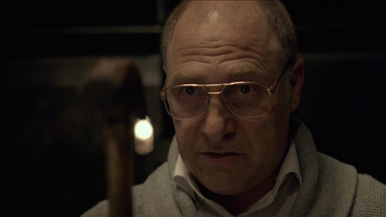Movie Review: Big Bad Wolves
As seen at the Stanley Film Festival
By Bruce Hall
May 16, 2013
BoxOfficeProphets.com

The funny thing about Big Bad Wolves is that it’s actually kind of funny, but not before it’s really, really not. The movie sets up a powerfully disturbing tonal contrast and coyly dangles it in front of you for two hours. It begins with a haunting, slow motion scene of three children at play inside an abandoned house. As they frolic, a grim, almost operatic score swells and hits its crescendo with the disappearance of one of the girls. All that remains is a tiny red shoe, and as the stylishly dour titles appear, it's obvious we're about to be screwed with. We all know there's nothing remotely funny about the abduction of a child...right?
Right.
But the very next scene involves a cop and two hired goons beating the shit out of a suspect with a level of panache I would normally associate with Scorsese. Miki (Lior Ashkenazi) is the lead detective on the missing girl’s case. Thanks to an eyewitness tip, suspicion has fallen on a sniveling grade school teacher named Dror (Rotem Keinan). Unable to obtain a confession, Miki has hired a pair of heavies to jog the suspect's memory. Righteous indignation and the thrill of illegal activity are too much for them, and things start getting out of hand - until Miki's boss calls and puts a stop to it. A very black, Cohenesque streak of humor runs through the scene, so much so that I completely missed the part about the eyewitness description.
The sudden change in tone was so profoundly effective that I accidentally laughed right over a critical plot point. I mentioned this to Aharon Keshales after the screening and I would describe his reaction as "bemused". I'd say he either thought I was an idiot, or there will be a hasty set of reshoots (har). Either way, the point is that Big Bad Wolves brilliantly, meticulously lays out a horrifying set of stakes, and then lightens things up just enough to get you to let down your guard. But the bitter taste from that first scene never leaves you, rotting in the pit of your gut like bad shrimp. The outrage you instinctively feel toward one who would harm a child still lingers, ready to be recalled by the filmmakers whenever they want to get back into your head.
This is done for good reason, and with no small amount of skill.
Through a particularly amusing set of circumstances, Miki's back alley beatdown ends up on YouTube, resulting in his demotion. But it doesn't stop him from continuing to intimidate Dror, and with his boss' blessing. At the same time, the victim's father (Tzahi Grad) has purchased a cabin in the wilderness, and retrofitted the basement like a medieval torture chamber. He intends to kidnap Dror from police custody and force the man who “allegedly” killed his daughter to confess the truth. Meanwhile, all the accusation and intimidation has caused Dror's life to crumble as his students, coworkers and even family turn against him. He has an estranged wife, and a daughter similar in age to the girl who died - so he couldn't be the killer…right? What if this guy is innocent, and the police - and the father - are making a mistake?
And that's what this movie does to you. It never lets you forget what’s at stake, but it also never stops distracting you with ethical ambiguity. The police have no real evidence, so it’s hard to know how to feel about the zeal with which they pursue their man (but an innocent child was tortured and killed). We sympathize with the father’s anguish and want to see justice done, but what if he’s about to torture the wrong man (but what if he’s not)? We are especially meant to ask ourselves these things as father and cop finally clash over the opportunity to torture a confession out of Dror, as he tearfully - intellectually - argues they have the wrong man. And when the torture commences, both captors, an unexpected visitor, and you the viewer must come to grips with the morality of what you're seeing.
Keshales and Papushado expect you to have a strong stomach, but they're also asking you to check yourself in the mirror - without trying to tell you what you should see. Most of us will carry out of Big Bad Wolves what we take into it, but chances are the things that go through your head while watching this movie will surprise you. The undercurrent of ironic humor is always present but the grim backdrop of torture, loss of innocence and fundamental morality combine to play dirty tricks with your values. And in the end, when most of the questions are answered, you may find yourself wondering whether doing evil to punish evil means that evil wins either way. The final scene in this film will be with you for some time and if it isn’t, then you’re obviously a danger to yourself and others.
There are so many things going on in this movie, and on so many layers, it's impossible to cover them all without boring you into a state of permanent insanity. I would just suggest that if and when you have a chance to see this film you do so, and I dare you to tell me you aren't still thinking about it a few days later. Big Bad Wolves isn’t perfect, (because only Goodfellas and Ghostbusters are perfect) but it’s a very, very strong effort and I highly suggest you remember the names Aharon Keshales and Navot Papushado. Even if you can’t pronounce them, write them down somewhere - because I guarantee you haven’t heard the last of them.